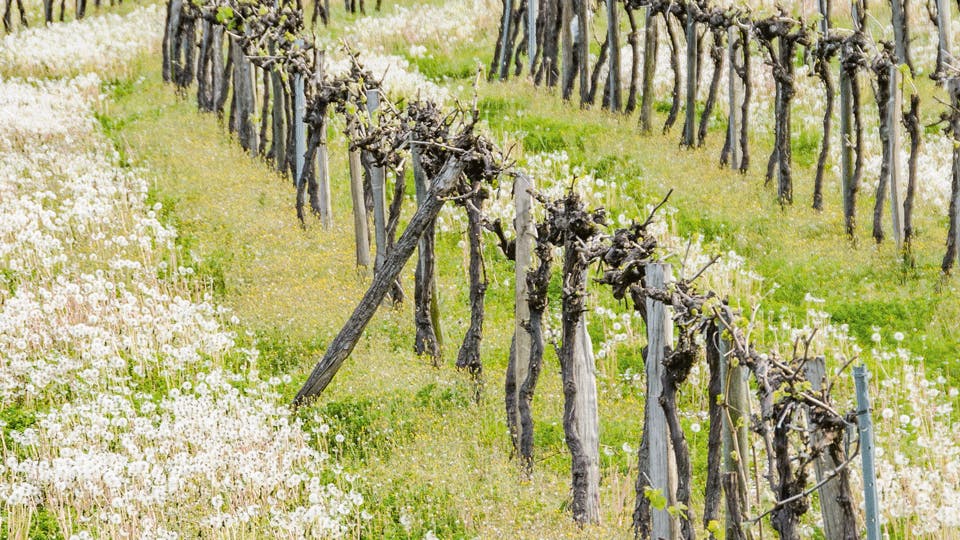The Rémy Cointreau brands cultivate their terroirs with the utmost care to combat global warming. In the Samos vineyards, the grain fields of Islay or on the slopes of Isère, the Group’s men and women are cleverly adjusting their farming method sand innovating while respecting local expertise, in order to pass on their inheritance to the generations following in their footsteps.
Ensuring 100% of the Group’s terroirs implement responsible methods by 2025
The House of Rémy Martin is spearheading environmental commitments in the Cognac region. In 2012, it was the first to obtain High Environmental Value (HVE) certification for its Estates. Backed by the French Ministry of Agriculture and Food, this recognition of excellence acknowledges the House’s practical and measurable commitments around four themes: biodiversity, plant protection strategy, fertilisation management, and preservation of the region’s soil sand water quality. The House lays claim to Sustainable Exception and strives to spread its vision of sustainable agriculture more widely by onboarding the largest number of winegrowers in a virtuous approach.
A practical illustration of the brand’s role in driving this inter-professional impetus,100% of the AFC cooperative has been committed to a collective, sustainable viticulture approach for two years now. This year, a new group of winegrowers obtained level 3 HVE certification - the highest level of commitment in this certification. The 253 winegrowers of the AFC with level 3certification are making a major contribution to the inter-professional drive for sustainable agriculture. The AFC winegrowers represent 86% of all HVE (level 3) certified farms in Charente. They are adding to the momentum of HVE certification in Nouvelle-Aquitaine, the region with the highest number of HVE-certified farmers in France.
The House now encourages winegrowers who are ready to apply for dual certification, as provided by the BNIC (Bureau National Interprofessionnel du Cognac), which integrates criteria specific to the Cognac production line (CEC - Certification environnementale de la filière Cognac) in addition to the requirements of the HVE certification introduced by the French Ministry of Agriculture and Food. Rémy Martin hopes to have 70% of its partners classified as HVE- or CEC-certified by 2024, and 100% by 2028.
In its Estates, Rémy Martin is testing alternative and natural solutions to protect the vineyards in order to improve the long-term fertility potential of the soil and establish even more sustainable wine growing practices by 2025. The Biocontrol and Ecosystem Balance (BEE) project is a new experiment in Charente. In 2018, the Rémy Martin Estates set up a pioneering experimental platform in the region with the French Wine and Vine Institute (IFV). The study conducted makes it possible to test farming systems that limit their use of plant protection products by introducing biocontrol products.
In Barbados in the Caribbean, the world’s oldest commercial rum distillery has undertaken an ambitious project that proves that anything is possible to people of good will. The land used for sugarcane production had to be restored and fertilised to enrich the soil. The Mount Gay teams set up a crop rotation system by introducing food crops such as sweet potatoes and pigeon peas, which are now planted alongside mango, pomegranate and mahogany trees. The aim by 2023 is to further extend the development of these mixed farming practices and share them with local farmers.
In order to improve its knowledge of the terroir, reintroduce biodiversity and, most importantly, increase the resilience of the plantation’s ecosystem and that of the island overall, the rum brand acquired 134 hectares of sugarcane production land in 2018. Since then, Mount Gay has been testing new farming methods(organic farming and permaculture) on these plots and aims to convert its entire plantation to organic farming within four years. Test plots were planted with a different cultivar each, selected for their unique characteristics and suited to their microclimate. As of the 2021 harvest, the seeds will be harvested individually to obtain a specific molasses per "climate" and then distilled and aged separately; this is already being done at Domaine des Hautes Glaces. Ultimately, a range of plot-based and single-varietal rums will allow rum enthusiasts to see that making better rum starts with planting trees and crops.

